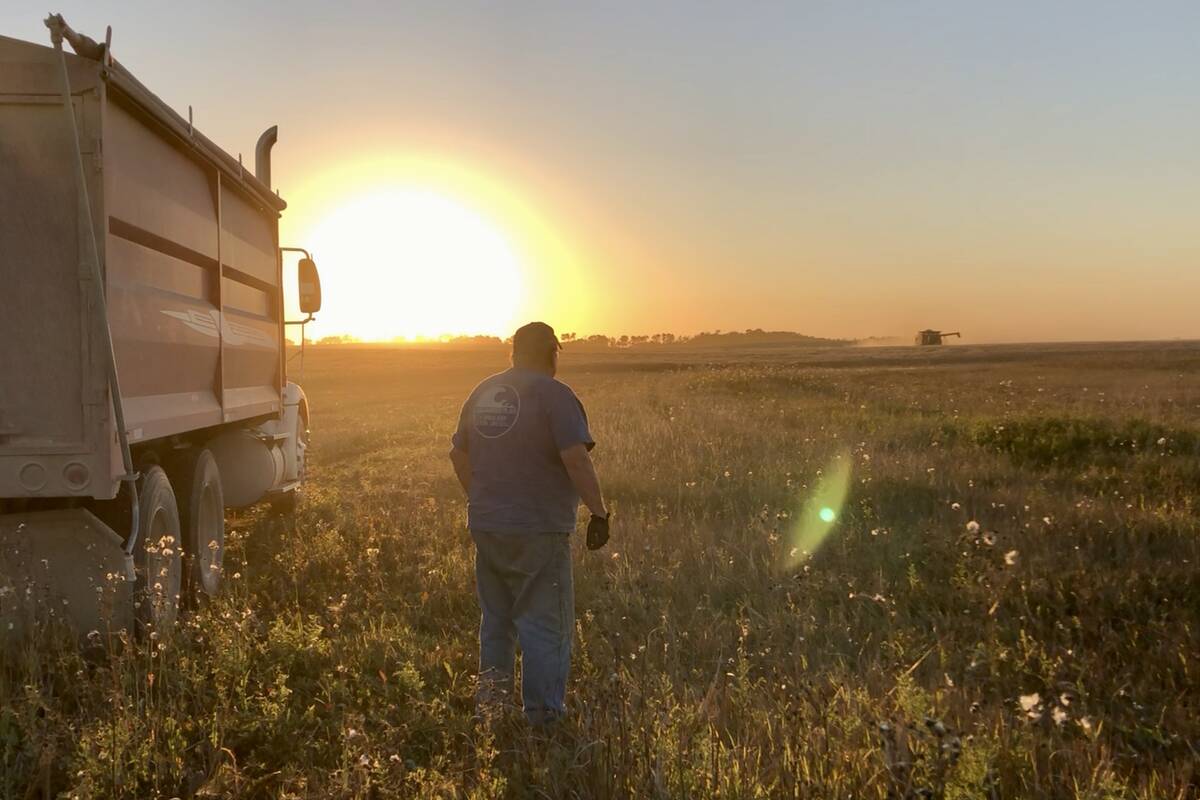MUNDARE, ALTA. – Gary Broenner is one of about 40 farmers owed money from the bankruptcy of All Grain (Alberta) Ltd.
And while Broenner was hauling grain to the company’s facility in Bentley, Alta, the Canadian Grain Commission was trying to determine whether All Grain required a licence to operate.
“It upsets me that they allow this guy to operate,” said Broenner of Mundare, Alta., who lost $8,000 when the company declared bankruptcy last February. It was not licensed under the Canada Grain Act.
Broenner needed to raise $5,000 by the end of July to pay a Canadian Wheat Board cash advance he took on the grain he sold to All Grain last December.
Read Also

VIDEO: Bittersweet harvest for this family farmhand
Bruce Burnett helps his brother harvest wheat and canola for the last time on the family farm in Manitoba where they both grew up.
He has farmed for three years and was wary of selling to All Grain, but neither the local Agricore nor Pioneer elevators would take the wheat with barley dockage. Local feedlots in the area also refused it, claiming it would be too difficult to balance the cattle ration.
With limited options, Broenner sold to All Grain.
Documents received under the Access to Information and Privacy Acts revealed that for more than two years, the Canadian Grain Commission wrote letters to P. Thomas Erling-Tyrell, owner of All Grain (Alberta) Ltd., asking him to supply documents that would show whether he should be licensed by the grain commission.
Documents showed Erling-Tyrell ignored the letters or wrote back saying his company only cleaned grain so he didn’t need a grain dealers licence.
He also did not answer questions about his facilities that may have indicated he was obliged to obtain an elevator licence before he could operate.
Farmers with elevators on their farms, feedmill operators and seed cleaning type elevators don’t require a licence from the grain commission. All other elevators do, according to the Canada Grain Act.
Reg Gosselin, director of corporate services with the grain commission, said it cannot force grain companies to co-operate.
“There is no obligation for unlicensed dealers to provide information,” said Gosselin.
The commission’s only power against unlicensed dealers is a threat of court prosecution, he said, which must be backed with clear evidence the operator is violating the Canada Grain Act.
Gosselin said the threat of prosecution has seldom been used in recent years.
Correspondence with Erling-Tyrell indicates the commission apparently believed All Grain was operating only a seed plant to clean lightweight feed grains, mixed feed grains and heated feed grains in the beginning.
When the agency’s assistant commissioner Hartmann Nagel of Woking, Alta., interviewed Erling-Tyrell in November 1998, he recommended All Grain be exempt from requiring a licence.
Nagel did not tour the grain facilities. The exemption was never provided.
Grain commission notes suggest that staff suspected All Grain was dealing in more than feed grain and was operating a grain elevator.
The Canada Grain Act prohibits individuals from operating a grain elevator unless it is licensed by the grain commission as a grain dealer or issued a grain licence.
“Towards the end it became clear he was buying and selling grain,” said Gosselin.
In a letter to All Grain from grain commission compliance officer Peter Clarke in October 2000, Clarke asked Erling-Tyrell directly if his facility fit the definition of an elevator.
As late as Dec. 7, 2000, Erling-Tyrell wrote to the commission saying he did not need a grain dealer’s licence.
“Some time in the future we may need to apply if our business changes,” he wrote.
In April 1999, All Grain took over the operation of the UGG grain elevator in Bentley, only a few hundred metres down the road from his seed cleaning plant.
UGG regional manager Wayne Tyner said they sold the elevator to Erling-Tyrell in April 1999, but UGG received no money for it.
When UGG heard of the bankruptcy, it resumed ownership of the elevator.
The Western Producer was unsuccessful in attempts to contact Erling-Tyrell at his Vancouver home or through All Grain’s bankruptcy trustee, BDO Dunwoody, of Edmonton.
Don Whitecotton, a Bluffton, Alta., farmer who lost $11,000 when All Grain declared bankruptcy, said the grain commission didn’t seem to know how to deal with All Grain.
“He was running the show,” said Whitecotton, whose grain was hauled directly from his farm to the Bentley elevator.
“This guy should have been licensed. He had an elevator. I shouldn’t have to check up on him,” said Whitecotton, whose lawyer received a judgment against All Grain for money owing the day All Grain declared bankruptcy.
Gosselin doesn’t consider the two-year correspondence with All Grain an excessive time to complete a licence.
It’s not easy to get a licence from the grain commission. Only 105 grain companies are licensed in Canada.
Companies that want to become licensed must provide audited financial statements, articles of incorporation, copies of grain receipts, at least $150,000 of security and operating lines of credit among other requirements.
One licensed grain company estimates it costs about $14,000 a year to maintain its licence.
Brenda Brindle, with the provincial government’s Alberta Grain Commission, said there has to be a way to provide security for farmers and allow for competition in the grain business.
The Alberta Grain Commission had arranged a meeting between farmers affected by the All Grain bankruptcy and the Canadian Grain Commission.
AGC cancelled the meeting after the CGC refused to attend.
“They (CGC) were concerned with the farmers pushing for a settlement and they considered the file to be closed,” said Brindle.
According to the bankruptcy documents, the Community Credit Union in Red Deer and the Canada Customs and Revenue Agency are the two secured creditors.
There are 58 unsecured creditors, mostly farmers and truck drivers. Combined, they’re owed $358,000.
The only asset listed is the seed cleaning plant in Bentley and a bit of office furniture.
Tim Ludgwig, bankruptcy trustee with BDO Dunwoody Ltd., said there has been interest in the plant but no offers.
A few years ago changes were made to the Canada Grain Act so the commission is not liable for grain delivered to an unlicensed dealer.
“There isn’t going to be any money available for the farmers that lost money,” said Gosselin.
“Farmers have some obligation to check to see who he’s dealing with.” Gosselin added that staff tells farmers to deal only with licensed grain dealers.
“At the end of the day we cannot control the decision by a farmer to sell to an unlicensed dealer.”
















